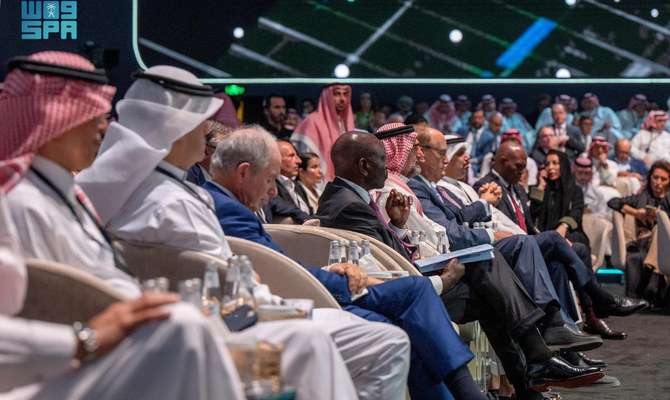RIYADH: Top of the agenda on the first day of the seventh edition of the Future Investment Initiative forum was the global energy transition.
Saudi Arabia’s Vision 2030 reforms to diversify its oil-dependent economy has led it to work more closely with new markets in Asia, such as South Korea and Japan, and in African countries like Kenya, as destinations for the future supply of clean energy, such as hydrogen.
On Sunday, in the lead-up to FII, Saudi Arabia and South Korea signed 46 corporate deals and basic agreements across economic, energy and technology sectors during the visit of the President of the Republic of Korea Yoon Suk Yeol to the Gulf nation — investments worth $30 billion with Korean firms.
Among these, Korea National Oil signed an agreement with Saudi Aramco for a joint oil storage business, and Korea Electric Power and steelmaker Posco Holdings, among others, will work with Aramco on an ammonia production project.
Bilateral agreements were concluded, leading to the establishment of the Hydrogen Oasis Initiative to promote and foster cooperation in the realm of green and clean hydrogen.
Yoon emphasized the long-standing economic ties between the Kingdom and South Korea during a panel in which Crown Prince Mohammed bin Salman was also present, “Remapping Korea’s Cooperation with the Middle East in a New Economic Era.”
Yoon said: “Our bilateral economic collaboration is expanding.
“Saudi Arabia is transforming itself from a simple oil producer to an advanced industry powerhouse and South Korea has achieved industrialization in a short period of time. We want to expand our collaboration with the Kingdom and strengthen our solidarity, from economic cooperation to cultural and human exchanges.”
He added: “We must join forces to respond to climate change. Saudi Arabia has a green energy initiative and policies to support their plan, including in renewable energy and carbon-free energy and other areas related to new technologies in these areas. And we will strengthen our investment to that end.”
Fossil fuels comprise 80 percent of energy sources, but renewables are predicted to reach 90 percent by 2050.
Saudi Energy Minister Prince Abdulaziz bin Salman said during the conference that the energy transition will require hydrocarbons, including petrochemicals. He noted recent multi-billion-dollar acquisitions by ExxonMobil and Chevron to demonstrate how hydrocarbons were here to stay and very much part of the energy transition.
How human beings consume energy is key. New nuclear, solar, wind and water technologies are now coming into the limelight. Solar and wind powered 12 percent of the world’s electricity in 2022.
According to Ember, a climate and energy think tank, to achieve net-zero emissions, alternative energy sources need to increase to 41 percent of the world’s electricity by 2030.
“Wind and solar get us about halfway to meeting our climate goals,” Joseph McMonigle, the secretary-general of the International Energy Forum, told Arab News.
“The other half must come from new technologies like CCUS (carbon capture, usage and storage) or hydrogen or fusion that are not really at commercial stages yet, and other technologies that we are not even talking about right now. We must recognize that.
“We have to try and meet the renewable goals under the net-zero plan, but we need to recognize that these other technologies aren’t yet available to us yet, so we have to keep investing in hydrocarbons until they are, otherwise prices will skyrocket and there will be tremendous volatility.
“Wind and solar cannot solve the problem, even the IEA (International Energy Agency) says that.”
During a panel on “Rebalancing the Global Energy Equation,” Amin Nasser, president and CEO of Aramco, similarly noted the challenges but emphasized the need to keep pursuing renewables.
He said: “You need a transition that takes the economic maturity of different countries and at a multi-speed, otherwise we are not going to meet what we are aspiring to for 2050.”
On the sidelines of the FII, representatives from the Kingdom met the President of Kenya William Ruto.
Bilateral relations between the countries were reviewed, and opportunities for joint cooperation in various fields were discussed.
Ruto spoke during the last panel of the day, “Africa’s Climate Positive Growth Agenda,” during which he discussed how the continent of Africa — and Kenya in particular — was leading the Global South and the world toward a sustainable future.
Some 81 percent of Kenya’s electricity generation came from the low-carbon sources of hydro, wind, geothermal and solar power in 2021.
During the first African Climate Summit in Nairobi in September, Ruto stated his ambition is to achieve 100 percent renewable power in the country by 2030 and to fuel the green industries of the future by 2040.
Ruto is head of the Committee of African Heads of State and Government on Climate Change and launched the Accelerated Partnership for Renewables in Africa at the African Climate Summit.
Africa has an estimated 40 percent of the world’s renewable energy resources — wind, solar, geothermal and hydro — yet only receives 2 percent of the renewable energy investments, spotlighting the urgent need for strategic climate financing to bridge the gap between opportunity and outcomes.
Ruto believes in finding “African solutions to African challenges.”
The energy transition in Africa can potentially lead to climate positive growth and economic development, thus serving to rapidly reduce global emissions.
Ruto said: “We are facing a climate catastrophe and to us it has raised the prices of fertilizer, the price of grain and cost of living.
“In Kenya, we lost two-and-a-half million heads of livestock in northern parts. To eliminate these challenges, it is perfectly right for us to pursue our development using renewable energy.
“We do not have to exploit other resources because if we can do it with clean energy, explain to me why we want to use energy that is not clean energy and that damages our climate, especially for us who are suffering so heavily from climate change.”





































